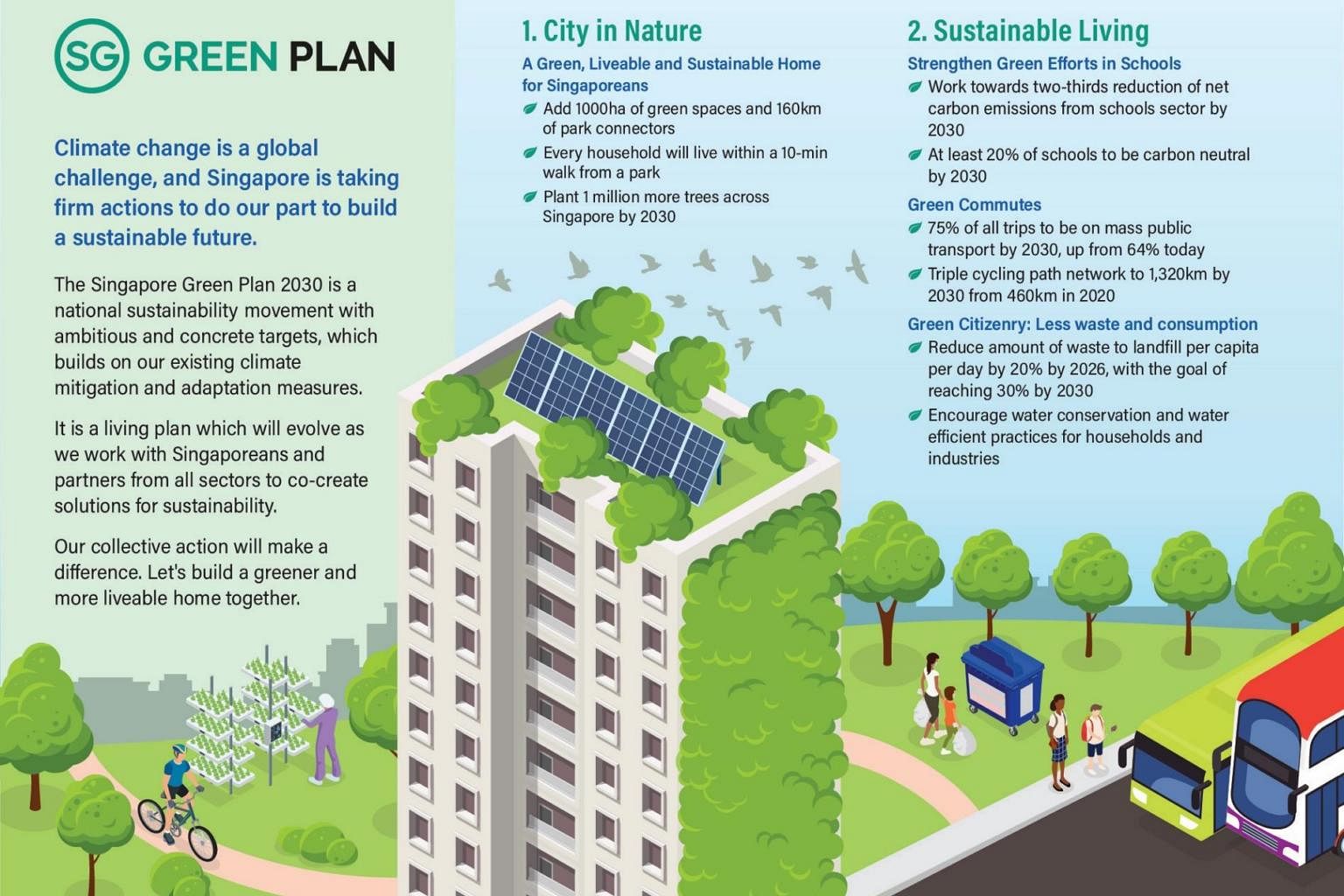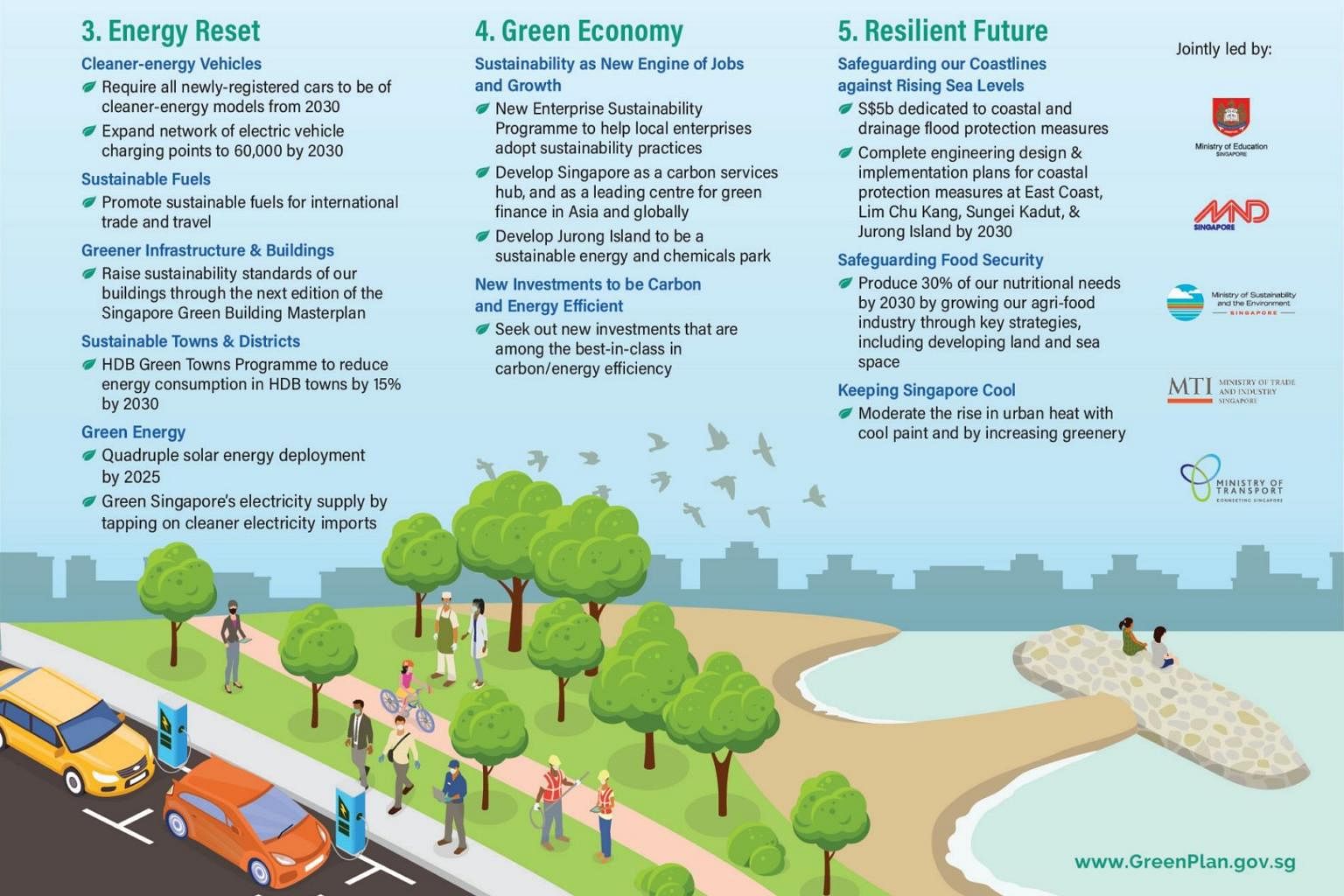SINGAPORE - Life in Singapore looks set to be much greener by 2030, with new sustainability initiatives to change the way people work, study and play.
The Singapore Green Plan 2030, which was released by five ministries on Wednesday (Feb 10), will help chart the country's way towards a more sustainable future over the next decade.
The wide-ranging plan cuts across all sectors of society, ranging from infrastructural development, research and innovation, to training programmes.
The aim is to get the whole nation together as it seeks to transition into a more sustainable future - in line with global momentum for countries to "build back better" as they recover from the economic fallout of Covid-19.
The five ministries backing the plan are the Ministries of Education, National Development, Sustainability and the Environment, Trade and Industry, and Transport.
"The comprehensive plan will strengthen Singapore's economic, climate and resource resilience, improve the living environment of Singaporeans, and bring new business and job opportunities," said the ministries in a joint statement.
"It will influence all aspects of our lives, from how we live to how we work and play, as we work together as a nation to make Singapore a greener and more liveable home," they added.
Broad details of the Green Plan were shared by ministers helming the five ministries in a slick 15-minute video, in which each of them spoke on the areas under their charge.
There are altogether five pillars in the plan - City in Nature, Sustainable Living, Energy Reset, Green Economy and Resilient Future.
A greener future
Under the Green Plan, at least 20 per cent of schools here will be carbon neutral by 2030.
Adults, too, will work in greener buildings, since there are plans to raise the sustainability standards of buildings by then.
This includes reviewing the existing Green Mark scheme which certifies buildings as being "eco-friendly", and supporting the development of cost-effective green technologies that promote energy efficiency.
People will be encouraged to commute in a greener way - cycling paths will triple in length by then, and the rail network will also be expanded to 360km, up from 230km today.
All of this infrastructure will be built within a city cloaked in green as more initiatives are rolled out to help nature meander its way into the heartland and the hearts of residents.
For instance, more vegetation will be planted along the roads to reduce ambient temperature, while more nature parks are set to sprout up over the years.
By 2030, there will be an over 50 per cent increase in nature park land where people can go hiking or bird watching.
Even the fossil fuel haven of Jurong Island will be transformed into a "sustainable energy and chemicals park" under the Green Plan.
Behind the scenes, research and innovation will continue to help Singapore harness low carbon alternatives like using hydrogen as a fuel, even as programmes such as the new Enterprise Sustainability Programme is rolled out to help Singapore firms develop capabilities in this area and the promotion of the country as a sustainable tourism destination.
More details on the Green Plan will be given during the Budget next week, and in the subsequent Budget debates, said the ministries.
The Green Plan was first mentioned by Minister for Sustainability and the Environment Grace Fu in Parliament on Feb 1, following a robust debate in the House over a motion filed by six People's Action Party backbenchers, calling on Singapore to deepen and speed up efforts to mitigate and adapt to climate change.
Prime Minister Lee Hsien Loong said in a Facebook post on Wednesday that while Singapore may be a small country lacking natural resources, it can still press on with technological and policy solutions for sustainable development.
The Green Plan will build upon Singapore's sustainability efforts in decades past, and help the country fulfil its commitments under the United Nations' 2030 Sustainable Development Agenda, he added.
We will do all we can to combat climate change," said Mr Lee. "We need to ensure a Singapore for our future generations. All of us have to work together, and make Singapore a bright green spark for the world."
Climate policy observer Nor Lastrina Hamid, co-founder of the Singapore Youth for Climate Action, said that while many initiatives outlined in the Green Plan had been announced before, she was heartened that multiple ministries were involved in the plan.
She noted that sustainability cuts across many areas, and having ministries work together could help resources to be pooled.
"What I am also optimistic about is this promise to transform Jurong Island into a sustainable energy and chemicals park. Given that Jurong Island is home to many petrochemical industries, it makes me curious too what the plans are for Jurong Island in the coming years," she said, adding that she will be keeping a close watch on developments in this area.
Given that the Green Plan is a whole-of-nation effort, Ms Lastrina said she hopes to see more regular engagement between the government, and civil society and the general public to help the plan materialise.
More information on the Green Plan is available here.




